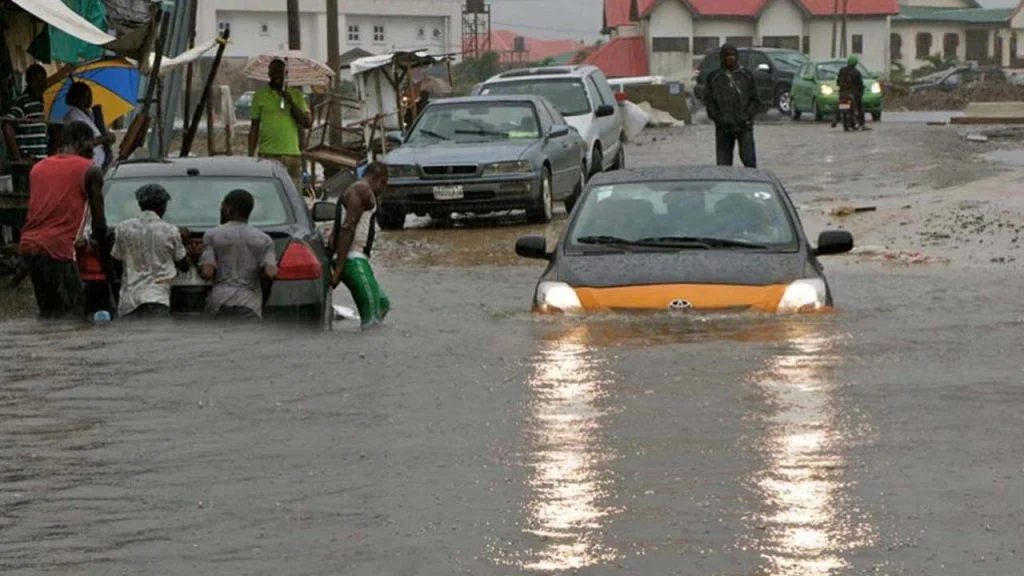
An uneasy calm hangs over Lagos, Nigeria’s commercial hub, particularly on the Island, as residents brace for what experts predict could be one of the worst flood seasons in recent years.
The fear was heightened following a fresh warning by the Nigeria Hydrological Services Agency, NIHSA, which listed Lagos among states at high risk of severe flooding in its 2025 Annual Flood Outlook unveiled last week in Abuja.
The Minister of Water Resources and Sanitation, Prof. Joseph Utsev, who presided over the event, urged residents in flood-prone communities, particularly those on Lagos Island, Lekki, Victoria Island, Ikoyi,and Ajah, to prepare for severe flooding due to heavy rainfall, rising sea levels and overstretched urban drainage infrastructure.
For many Lagosians, this is not an unfamiliar dread. The city, perched precariously on the Atlantic coast, has witnessed repeated flood disasters over the years, incidents that have damaged properties, paralysed businesses and displaced many families.
The pattern dates as far back as 2012 when Lagos experienced severe flooding following torrential rains in July. Major streets such as Ahmadu Bello Way, Ozumba Mbadiwe and Marina on the Island were completely submerged.
Businesses were forced to close, while vehicles and pedestrians alike were stranded for hours in waist-deep water.
The year marked one of the worst flood disasters in the state’s history. That year, floodwaters submerged homes across Ikoyi, Lekki Phase 1, Victoria Island and parts of Ajah.
Residents waded through waist-high water as several roads became impassable. Many were displaced, with properties worth millions of naira lost to the deluge.
In the wake of NIHSA’s warning, Lagos residents have expressed deep concerns over the looming flood threat.
Funmi Adebayo, a civil servant and resident of Lekki Phase 1, in an interview with DAILY POST said “Each time the rains come, we live in fear.
“Last year, water flooded my sitting room and destroyed my furniture. I had to replace household items worth over N2 million. These annual warnings only remind us of our helplessness.”
Kennedy Terfa, a media executive based in Victoria Island, lamented that “Flooding here has become a tradition. In 2022, my office server and several gadgets were destroyed when water poured in during a downpour. The government makes promises every year, but we hardly see sustainable action.”
Titi Balogun, a teacher living in Oniru Estate, expressed her frustration thus: “During the rainy season, I barely sleep at night.
“We’re constantly checking if water levels are rising. Last year, a neighbour’s fence collapsed because of flood pressure. It’s terrifying, especially with children in the house.”
Ayo Shonibare, a commercial driver who plies the Ajah–Lekki–Victoria Island route, noted: “Once it rains, everywhere locks down. Our roads are terrible and the drains are always clogged.
“It’s either you risk your vehicle getting stuck or stay home and lose income. Nobody should have to live like this in a city like Lagos.”
Meanwhile, responding to the growing tension, the Lagos State Government has reiterated its preparedness to manage the anticipated downpours and flooding, particularly in vulnerable areas on the Island.
Commissioner for the Environment and Water Resources, Tokunbo Wahab, during an inspection of the ongoing Lagos Island Urban Regeneration Project, assured residents that proactive steps were underway.
Wahab confirmed that the Emergency Flood Abatement Gang (EFAG) had been fully mobilized to operate year-round, focusing on desilting blocked drainages, clearing canals, and addressing flood-prone areas.
“We are not treating this as business as usual. Our drainage clearing and urban regeneration projects on Lagos Island and other flood-prone areas are in top gear.
“EFAG teams have been deployed across the state and will remain active throughout the year to prevent disaster,” Wahab stated.
He further appealed to residents to cooperate with government agencies by avoiding indiscriminate waste disposal, which contributes to drainage blockage.

